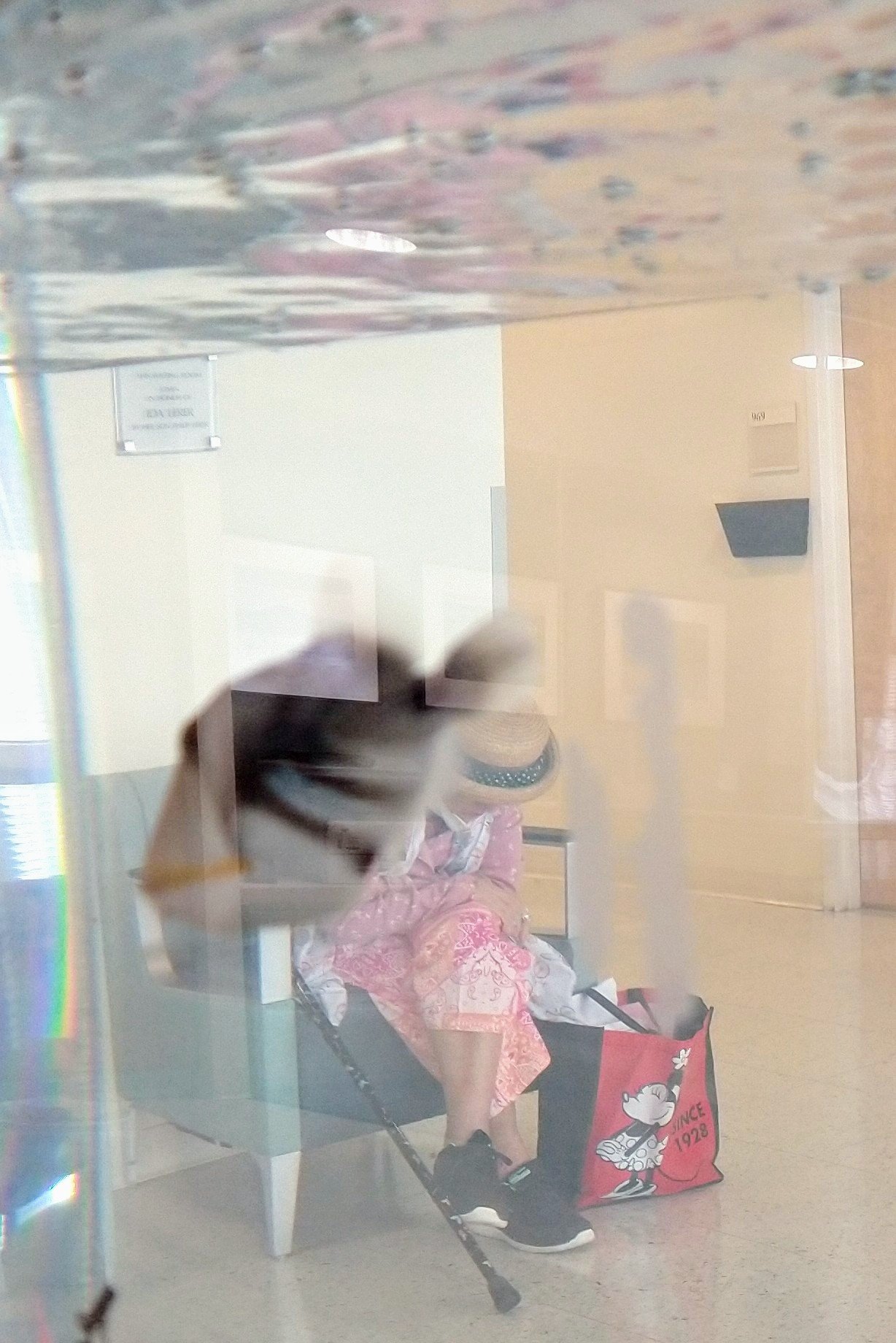During my many years with chronic illnesses, I’ve spent far more time waiting for healthcare than actually receiving it. It’s always nerve-wracking. I never know how long I’ll be hanging around; it could be anywhere from minutes to hours. I fret over whether to go to the bathroom before or after an appointment, afraid I’ll miss my turn if I’m not there when they call me in. And of course, I worry about what I’ll hear when I finally get attended to; I’ve received lots of bad news over the years.
Read moreEndurance and Gratitude: A reflection on finding joy in difficult moments by Laura Carmen Arena
Both Karen George’s poem, and my “Triptych:Oncology Fish,” share an expression of admiration for the resplendent inner strength in our loved ones, emanating despite the foreboding shadows of illness, suffering and loss. The emotions floating around our lived spaces as our loved ones endure and battle disease in the face of difficult circumstances move in many directions including grieving, reflecting, hoping, enduring and celebrating, colors that shift and radiate with the heroically hopeful, illuminating presence of gratitude and love.
Read moreThe Luxury of Walking Away: An MS4 meditates on time, isolation and the comforts of home
A medical student contemplates her roles as a physician-in-training and learns to appreciate the privilege she possesses—unlike her patients—in walking away from the clinical space.
Read moreSavoring Sunset: A reflection on saying goodbye by physician assistant Sara Lynne Wright
A physician assistant ruminates about the cycle of life, of sunrise and sunset—and how we can better appreciate each waking moment.
Read moreOn Caring and Suffering by Michael Evans, William Doan, Kiernan Riley, Kalei Kowalchik, and Logan DeSanto
A nurse offers a plea in the face of a worsening pandemic and increasing burnout among healthcare professionals.
Read moreThe Hospital Gift Shop: An Unlikely Refuge by Maureen Hirthler
An emergency physician fondly looks back on an unlikely refuge within the hospital: the gift shop.
Read moreBeing a Patient: Coping with the Loss of Control and Privacy in a Hospital by Rebecca Grossman-Kahn
Patients often feel unexpectedly confined in the hospital.
Read moreI Lost a Patient Last Week by Carolyn Welch
Carolyn Welch worked for many years as a pediatric intensive care nurse and currently works as a family nurse practitioner. She has an MFA from the Bennington Writing Seminars. Her poetry collection, The Garden of Fragile Being, is forthcoming from Finishing Line Press. Her poem "Relapse" is in the Spring 2018 Intima: A Journal of Narrative Medicine
I lost a patient last week. This is not unexpected in the world of family practice. I have lost countless patients. During most of my career in pediatric intensive care, however, I lost them dramatically. They departed with fight and drama, chest compressions and epinephrine, and intensity. This patient left quietly, succumbing to congestive heart failure. He came in every week or two with waterlogged ankles and lungs when he forgot to take his meds. He missed his wife. He lingered to talk. His going was like the tide shifting in Ron Lands' poem “Listen to the Ocean.” Some other shore was calling him.
There are moments when we notice the breath is like the ocean rising and falling or like Lands' “moonlight floating on the water.” My own daughter’s battle with schizophrenia is teaching me the tending of good days, the collecting of moments.
Last summer, as I watered the garden, a hummingbird flew close, dipped in and out of the spray—his thirst and my offering meeting there on a hot uneventful day in July. Diana calls on good days between relapses. Lands' patient or father or mother labors to breathe until reminded of the light and the water. Waves bring what they have and take what they find. Lands' voice eases his listener from one moment to the next.
My patient’s death leaves a gap in the schedule, an unfilled prescription, a message from his son. And we go on. This smallness of death is part of its tragedy to those of us working close to it, but also when it visits our lives. The room get cleaned, the bills arrive, the dogs whimper for their supper. Some of us write poems in an effort to translate our experience and to tend to these moments of being.
Carolyn Welch worked for many years as a pediatric intensive care nurse and currently works as a family nurse practitioner. She has an MFA from the Bennington Writing Seminars. Carolyn’s poetry and fiction have appeared in Gulf Coast, Poet Lore, Sundog, Tar River Poetry, Conduit, Connecticut River Review, High Desert Journal, The Southeast Review, Zone 3, The Minnesota Review, American Journal of Nursing and other literary journals. Her poetry collection, The Garden of Fragile Being, is forthcoming from Finishing Line Press. Her poem "Relapse" is in the Spring 2018 Intima: A Journal of Narrative Medicine
Of Humans and Aliens by Andrea Hansell
“Hospitals tend to have an extraterrestrial air. Shiny structures filled with yawning expanses of slick, sterile floors, strange beeping machines, and masked creatures with gloves cutting open sleeping bodies.”
Read moreDoes A Poem A Day Keep the Doctor Away? Thoughts on Injecting A Dose of Culture in Medical Waiting Rooms by Debbie McCulliss
Scholars have begun encouraging doctors to gain more insight from their patients through narrative writing, especially poetry. According to Dr. Rita Charon, director of the Program in Narrative Medicine at Columbia University and co-editor of Literature and Medicine, “With narrative competence, physicians can reach and join their patients in illness, recognize their own personal journeys through medicine, acknowledge kinship with and duties toward other health care professionals, and inaugurate consequential discourse with the public about health care” (as cited in Encke, 2011).
Read more

